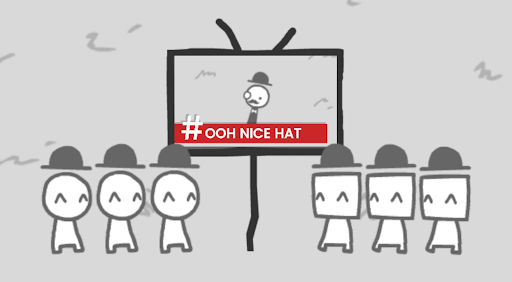We Become What We Behold
Roger Whitson, Managing Editor
“We Become What We Behold. We shape our tools and then our tools shape us.” Marshall McLuhan wrote these words in 1972’s Understanding Media: The Extensions of Man, and yet the quote’s origin occurs in William Blake’s 1804 poem Milton: “Terrified Los stood in the Abyss & his immortal limbs / Grew deadly pale; he became what he beheld” (E. 28-9). The developers admit the quote is “misattributed,” and indeed misattribution is the name of this particular game. “We Become What We Behold” asks you to point and click photographs of bouncing geometrical figures in a field of grass. These photos appear on the sign in the middle of the field and cause various changes to the game. At one point, a jaunty character appears with a cap, monocle, and waxed mustache. Photographing the figure causes the rest of the characters to decide that hats are cool and wear them as well. Photographing figures without the hat quickly changes the tune, however, as characters decide that they’ve had enough of hats and start to mock those that continue to wear hats.
Nicky Case’s game analyzes news cycles and their relationship to political dialogue. Much has already been said about the negative impact of social media on political radicalization and polarization. “We Become What We Behold,” adds little to this particular conversation. The uniqueness of Case’s game lies in the attention she gives to how the physical properties of media influence the largely unfounded associations that are easy to make with particular images. A random angry square-headed person screams in a photo that also happens to include a random circle-headed person. The resulting photo is tagged: “#Squares Hates Circles!” Each photo that includes anger or violence results in further anger or violence. “#Get Angry!” one later photo reads. Meanwhile, neutral or positive messages are ignored. After a photo reading “#Everyone hates Everyone,” a Circle and a Square appear with a sign indicating the desire for love and peace between the two groups. A resulting message whines, “[w]ho tunes in to watch #people get along?”
Case’s game about “vicious cycles” doesn’t really say anything particularly surprising, but it’s an effective analysis of how cycles of the news construct associations and narratives that were not actually there in the first place.
GwG Recommends provides a spotlight for games that catch our interest, with short explanations as to why the author is intrigued. We prioritize self-published, short-form experiences.



